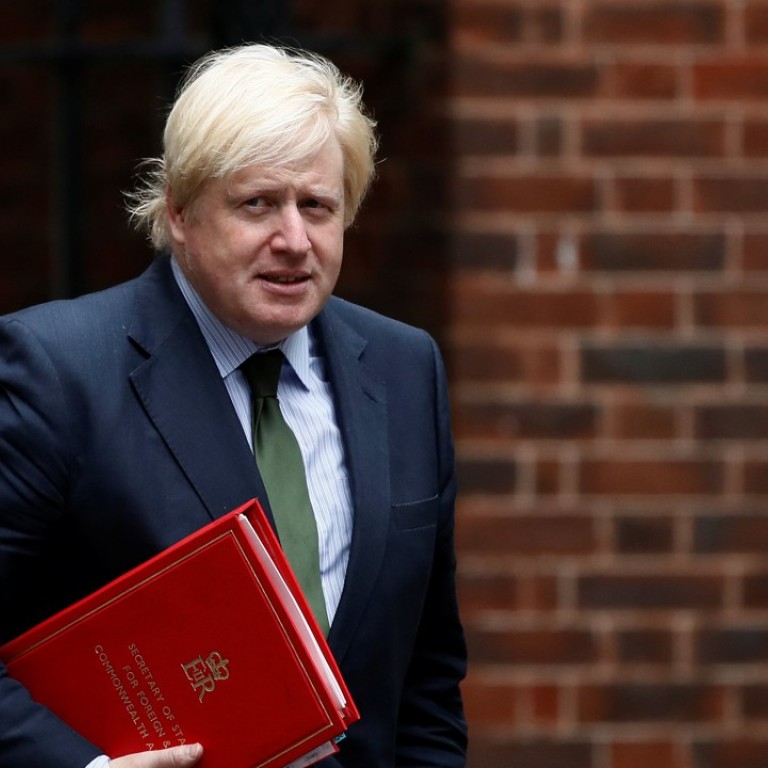
‘Important areas’ of ‘one country, two systems’ under threat, UK foreign secretary says in report
Document by Foreign Secretary Boris Johnson cites Beijing’s increasing influence in Hong Kong and reports of mainland security officials operating in city
The British government has warned that “important areas” of the “one country, two systems” model under which China governs Hong Kong have come under increasing pressure, citing reports of mainland security officials operating in the city and Beijing’s increasing influence.
In his latest six-monthly report to the UK parliament on Thursday, Foreign Secretary Boris Johnson made clear that the Sino-British Joint Declaration, under which Hong Kong’s high degree of autonomy is enshrined, remains as valid today as it was when it was signed by the British and mainland Chinese governments in 1984.
“We judge that ‘one country, two systems’ has generally functioned well since 1997. We can look back at Hong Kong’s significant achievements over the last 20 years since the handover, and look forward to many more in the years to come,” the report said.
“However, at the same time, we cannot ignore that important areas of the ‘one country, two systems’ framework are coming under increasing pressure.”
Watch: What does ‘one country, two systems’ mean?
In response to the report, the Hong Kong government said in a statement: “Foreign governments should not interfere in any form in the internal affairs of the (city).”
Since the handover, the statement said, the city has been exercising a high degree of autonomy and the principle of “Hong Kong people administering Hong Kong” in strict accordance with the Basic Law.
“This demonstrates the full and successful implementation of the ‘one country, two systems’ principle, which has been widely recognised by the international community,” it said.
Hong Kong’s mainland affairs chief accused of ‘one country, two systems’ breach over by-elections
The British government document cited reports of mainland security officials operating in Hong Kong, reports of Beijing’s liaison office in the city increasing its influence, as well as “continuing concerns” about the exercise of some rights and freedoms guaranteed by the Joint Declaration and the Basic Law, the city’s mini-constitution.
Xu Hong, director general of the Chinese foreign ministry’s treaty and law department, later clarified that the Joint Declaration was legally binding but that it did not give Britain the right to interfere in the city’s affairs.
Watch: What is the Basic Law of Hong Kong?
“(The Joint Declaration) remains as valid today as it did when it was signed by both the government of the UK and of China over 30 years ago and lodged with the United Nations. It is a legally binding treaty registered with the UN, and continues to be in force,” said the report, which covers the first half of this year.
“The UK government is committed to monitoring its implementation closely. We have been unequivocal about our position on this issue both publicly and privately with the Chinese government.”
Hong Kong must safeguard ‘one country’ for the sake of ‘two systems’
The report said the British government welcomed Chinese President Xi Jinping’s commitment to the continued implementation of the “one country, two systems” principle, which he set out during his visit to Hong Kong earlier this year.
“In line with this important commitment, it is essential that Hong Kong enjoys, and is seen to enjoy, the full measure of its high degree of autonomy and rule of law enshrined in the Joint Declaration and Basic Law,” it said.
Watch: What does Xi Jinping think of ‘one country, two systems’?
The report gave a summary of events that gripped Hong Kong in the first half of this year, including concerns that Beijing’s liaison office in the city had interfered in the chief executive election.
“The UK government’s view is that respect for Hong Kong’s high degree of autonomy and rule of law remain key to its success,” the report said. “We continue to take the view that the best way to secure the long-term future of ‘one country, two systems’ is through a transition to universal suffrage which meets the aspirations of the people of Hong Kong, within the parameters of the Basic Law.”

